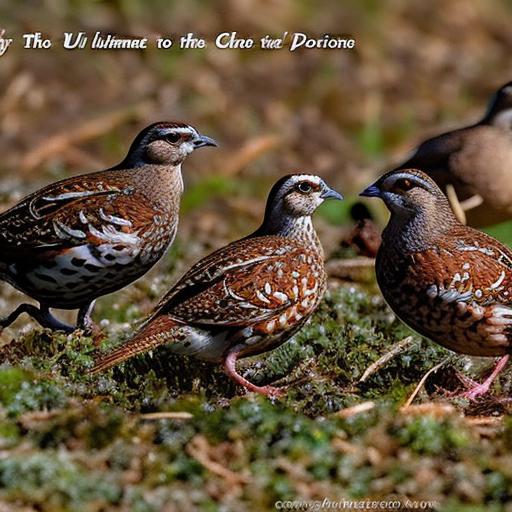Keeping quail for eggs is a rewarding and sustainable practice that has gained popularity in recent years. Quail are small, low-maintenance birds that are known for their prolific egg-laying abilities. They are an excellent choice for backyard poultry enthusiasts, homesteaders, and small-scale farmers who are looking to produce their own eggs. Quail eggs are not only delicious and nutritious, but they also have a variety of culinary uses, making them a valuable addition to any kitchen. In addition to their egg-laying capabilities, quail are also relatively quiet and can be kept in smaller spaces, making them an ideal choice for urban or suburban settings where traditional poultry may not be practical. Whether you are looking to raise quail for personal use or for sale, there are a variety of factors to consider when choosing the best quail breeds for egg production.
Key Takeaways
- Quail are a great option for egg production due to their small size and high egg-laying capacity.
- The top 5 quail breeds for egg production are Coturnix, Bobwhite, California, Gambel’s, and Japanese quail.
- When choosing quail for egg production, consider factors such as egg-laying capacity, temperament, and space requirements.
- Tips for raising quail for egg production include providing a balanced diet, adequate housing, and regular monitoring for health issues.
- Keeping quail for eggs has benefits such as high egg production, small space requirements, and potential for profit.
Top 5 Quail Breeds for Egg Production
1. Coturnix Quail: Also known as Japanese quail, Coturnix quail are one of the most popular breeds for egg production. They are known for their high egg production, with hens laying up to 300 eggs per year. Coturnix quail come in a variety of colors and are relatively easy to care for, making them a great choice for beginners.
2. Bobwhite Quail: Bobwhite quail are native to North America and are known for their flavorful eggs. While they may not lay as many eggs as Coturnix quail, they are still a good choice for egg production, with hens laying around 150-200 eggs per year. Bobwhite quail are also popular for their meat, making them a dual-purpose breed.
3. California Quail: California quail are another popular choice for egg production. They are native to the western United States and are known for their hardiness and adaptability. Hens typically lay around 100-150 eggs per year, making them a reliable source of eggs for small-scale producers.
4. Gambel’s Quail: Gambel’s quail are native to the southwestern United States and northern Mexico. They are known for their striking appearance and are popular for both their eggs and meat. Hens typically lay around 100-150 eggs per year, making them a good choice for egg production.
5. Button Quail: Button quail, also known as Chinese painted quail, are the smallest of the quail breeds commonly kept for egg production. While they may not lay as many eggs as other breeds, with hens laying around 50-60 eggs per year, they are still a popular choice for small-scale producers due to their small size and ease of care.
Factors to Consider When Choosing Quail for Egg Production
When choosing quail for egg production, there are several factors to consider to ensure that you select the best breed for your needs. First and foremost, it is important to consider the climate and environment in which you will be keeping the quail. Some breeds may be better suited to cold climates, while others may be more tolerant of heat. Additionally, it is important to consider the space available for keeping the quail, as some breeds may require more room than others.
Another important factor to consider is the purpose of keeping the quail. If you are primarily interested in egg production, you will want to choose a breed that is known for its prolific egg-laying abilities. However, if you are also interested in raising quail for meat, you may want to consider a dual-purpose breed that is suitable for both egg production and meat. Additionally, it is important to consider the availability of feed and other resources in your area, as some breeds may have specific dietary requirements.
Tips for Raising Quail for Egg Production
Raising quail for egg production can be a rewarding experience, but it is important to keep in mind a few key tips to ensure the health and productivity of your birds. First and foremost, it is important to provide a suitable living environment for your quail. This includes a secure enclosure that protects the birds from predators and provides adequate space for them to move around. Additionally, it is important to provide a balanced diet that meets the nutritional needs of the birds, including a high-quality commercial feed supplemented with fresh greens and protein sources.
Another important tip for raising quail for egg production is to monitor the health of your birds regularly. This includes observing their behavior and appearance, as well as conducting regular health checks to identify any potential issues early on. Additionally, it is important to provide clean bedding and regular access to fresh water to ensure the overall well-being of the birds. Finally, it is important to handle the eggs with care and cleanliness to ensure that they remain safe and suitable for consumption.
Benefits of Keeping Quail for Eggs
There are numerous benefits to keeping quail for eggs, making them an attractive option for small-scale producers and backyard enthusiasts alike. One of the primary benefits of keeping quail for eggs is their prolific egg-laying abilities. Quail are known for laying a high number of eggs compared to other poultry, making them a valuable source of fresh eggs for personal consumption or sale. Additionally, quail eggs are smaller than chicken eggs and have a delicate flavor, making them a popular choice for gourmet cooking and baking.
Another benefit of keeping quail for eggs is their small size and low maintenance requirements. Quail require less space and resources compared to other poultry, making them an ideal choice for urban or suburban settings where space may be limited. Additionally, quail are relatively quiet birds, making them a suitable option for those who may have noise restrictions in their area. Finally, keeping quail for eggs can also be a sustainable practice, providing a source of fresh, nutritious eggs without relying on commercial egg production.
Common Challenges in Keeping Quail for Eggs

While keeping quail for eggs can be a rewarding experience, there are also some common challenges that producers may encounter when raising these birds. One of the primary challenges in keeping quail for eggs is predator protection. Quail are small and vulnerable to predators such as raccoons, foxes, and birds of prey, making it essential to provide secure housing and fencing to protect the birds from harm.
Another common challenge in keeping quail for eggs is maintaining optimal environmental conditions. Quail are sensitive to temperature extremes and require suitable ventilation and temperature control to thrive. Additionally, it is important to provide clean bedding and regular cleaning of the enclosure to prevent disease and maintain the overall health of the birds.
Finally, one of the challenges in keeping quail for eggs is ensuring consistent egg production throughout the year. While quail are prolific layers, their egg production may be influenced by factors such as daylight length and temperature fluctuations. Producers may need to implement supplemental lighting or other strategies to encourage consistent egg production.
Conclusion and Final Thoughts on Choosing the Best Quail for Eggs
In conclusion, keeping quail for eggs can be a rewarding and sustainable practice that provides a valuable source of fresh eggs for personal use or sale. When choosing the best quail breeds for egg production, it is important to consider factors such as climate suitability, space requirements, purpose of keeping the quail, and availability of resources in your area. By selecting the right breed and implementing proper care and management practices, producers can enjoy the benefits of prolific egg-laying abilities and low maintenance requirements that make quail an attractive option for small-scale poultry production.
Overall, while there may be some challenges in keeping quail for eggs such as predator protection, environmental conditions, and consistent egg production, with proper planning and management these challenges can be overcome. The benefits of keeping quail for eggs including prolific egg-laying abilities, small size and low maintenance requirements make them an excellent choice for those looking to produce their own fresh eggs in a sustainable and efficient manner. With careful consideration and attention to detail, raising quail for eggs can be a fulfilling endeavor that provides a valuable source of fresh eggs while also contributing to a more self-sufficient lifestyle.
Looking to start your own backyard flock for fresh eggs? Check out Poultry Wizard’s article on the best quail to keep for eggs. This comprehensive guide provides valuable insights into the different quail breeds that are known for their egg-laying capabilities, helping you make an informed decision for your poultry setup. For more tips and advice on raising poultry, including geese care and egg production, be sure to explore Poultry Wizard’s other informative articles on poultrywizard.com.
FAQs
What are the best quail breeds for egg production?
The best quail breeds for egg production are the Coturnix quail, also known as Japanese quail. They are known for their high egg production and are the most popular choice for backyard quail keeping.
How many eggs can a quail lay in a year?
On average, a Coturnix quail can lay between 200-300 eggs per year, making them a highly productive option for egg production.
What are the advantages of keeping quail for eggs?
Keeping quail for eggs has several advantages, including their small size, low maintenance, and high egg production. Quail eggs are also considered a delicacy and are in high demand in certain markets.
What should I consider before keeping quail for eggs?
Before keeping quail for eggs, it’s important to consider the space and housing requirements, as well as the availability of feed and water. Additionally, it’s important to check local regulations and zoning laws regarding keeping quail.
What is the average size of quail eggs?
Quail eggs are significantly smaller than chicken eggs, with an average size of about one-third to one-fifth the size of a standard chicken egg.
Meet Walter, the feathered-friend fanatic of Florida! Nestled in the sunshine state, Walter struts through life with his feathered companions, clucking his way to happiness. With a coop that’s fancier than a five-star hotel, he’s the Don Juan of the chicken world. When he’s not teaching his hens to do the cha-cha, you’ll find him in a heated debate with his prized rooster, Sir Clucks-a-Lot. Walter’s poultry passion is no yolk; he’s the sunny-side-up guy you never knew you needed in your flock of friends!







